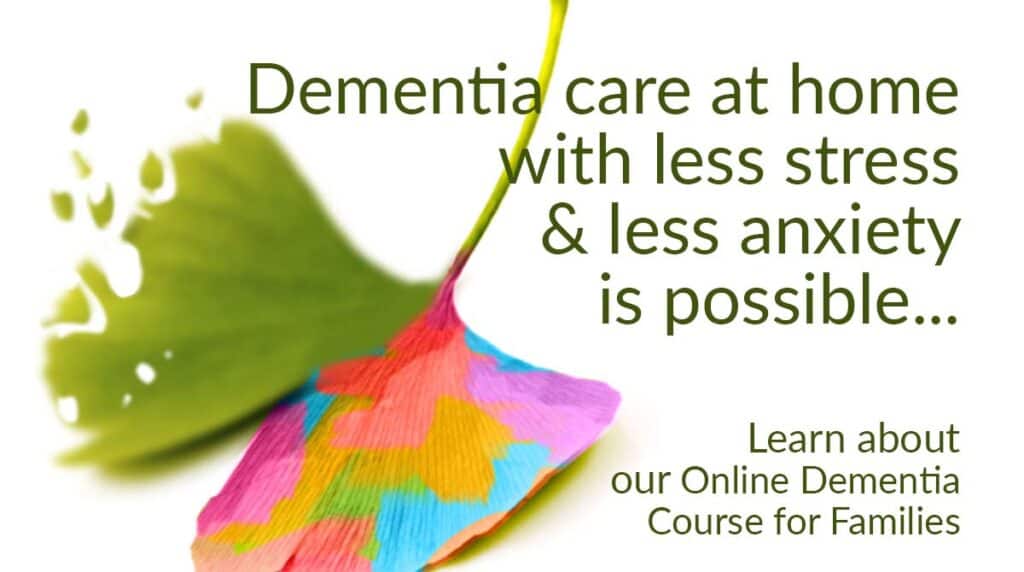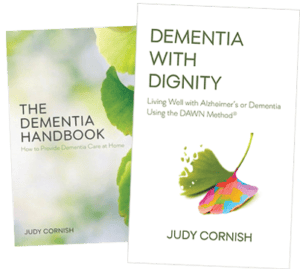How to handle a combative dementia patient**
[This article, “Dementia and Aggressiveness,” is the last in a series of three articles about mean dementia. See parts 1 and 2, “Mean Dementia—Dementia and Being Mean to Family,” and the “Dementia Anger Stage.”]
“You stop that or I’ll hit you!”
If you are someone who works with people who are experiencing dementia, or if you’re caring for a loved one with dementia at home, you either have heard this already or will hear it one day soon. Even worse, you may not hear it before they strike. All too often dementia brings with it anger, meanness, and combativeness, yet there are ways to deal with a dementia patient** who is aggressive and ways to help our loved ones not default into belligerence and anger.
**(Just so you’re aware… I do not like using the term, “dementia patient.” I would rather use “person experiencing dementia,” and I do use that phrase in my books and classes. Unfortunately, people who are searching for help with dementia caregiving often default to the phrase, “dementia patient,” because they are used to approaching care from a medical perspective. I mean no disrespect to those experiencing dementia.)
There is no simple answer—and nothing that can be said in a soundbite—that will help you when you’re dealing with someone who is experiencing dementia and being mean, aggressive, or combative (this is why I had to write three articles to cover the subject of mean dementia). You can learn to avoid combativeness, however, through understanding what triggers those types of responses.
In my first article, ‘Mean Dementia: Dementia and Being Mean to Family,’ I explained how knowing which skills our loved ones keep and which skills they lose will help you avoid inadvertently embarrassing them or frustrating them and getting angry responses as a result. In my second article (‘Dementia Anger Stage’), I explained how dementia leaves people unable to manage their own moods yet defenseless against their companions’ moods, and why nonverbal communications have more impact than words. If you haven’t read my first two articles, it would be best to read them before this one.
Feeling out of control results in frustration and aggression
In this article, we’ll look at another key reason for combativeness and aggression with dementia: the feeling of being powerless or out of control. You can lower both your stress as a caregiver and your loved one’s distress by learning how to help them feel more in control while you get through the day together.
When I teach families and caregivers how to provide person-centered dementia care with the DAWN Method®, I teach them how to support the person’s strengths—for we do not lose all our skills when dementia strikes (even though we do lose very much). We continue to have strengths, and it’s through understanding those strengths that we can provide care without igniting belligerence and fight-or-flight responses.

Adults are used to deciding for themselves
But before we start talking about empowerment, let’s think for a minute about whom we’re dealing with. Usually the person who’s experiencing dementia is an elder—a parent or grandparent or someone older than us. That means they have lived for many years as an adult. They grew from childhood to adolescence to adulthood, gathering skills and enjoying ever more freedom and autonomy as they matured. They have spent decades making decisions, exercising choice, and being self-determinant. They are accustomed to having autonomy and authority.
And, more than likely, this person who now is experiencing dementia also spent at least some of their adult years helping younger people learn life skills in the role of parent and grandparent, maybe also formally as a consultant, coach, officer, teacher, or employer.
Dementia takes away many of their choices
Yet now they find themselves being told what to do at every turn—when to wake, when to eat, what to eat, when to shower, what to wear—and usually by someone who is not even a peer, someone younger. Why would we not expect them to react with outrage? Especially if anosognosia is also present and they are unable to comprehend that they are experiencing the loss of cognitive skills and really do need help.
We should expect people who are experiencing dementia to react negatively when they find their dignity, privacy, and autonomy disregarded. It is a healthy response to resist having others take over the intimate tasks of selfcare. So then, how do we help people perform hygiene and household tasks once dementia makes them incapable of taking care of themselves? How do we help a parent or a dementia patient do what must be done for safety and health without getting combative and aggressive reactions? The only way to do it is by working with their strengths. Here are some techniques for doing that.
How do we decrease combative behavior and aggression in dementia patients?

1. Enhance their ability to exercise choice.
Think for a moment about how you make decisions about what you want. Maybe you’re at home and suddenly realize you’re hungry. First, you draw to mind what’s available in your fridge and cupboards. That takes memory skills. You hold the options in your mind and compare them—most likely rating them for preference, taste, and convenience. Do I feel like eating last night’s leftovers or a peanut butter sandwich? Do I have bread? I think there’s an apple left … that would be good with cheese …. This process is quite complex even though it occurs in nanoseconds—and it requires rational thinking skills.
Losing rational thinking means losing the ability to remember and organize options
If you are losing or have already lost either memory skills or rational thinking skills, you won’t be able to decide what you really feel like eating even when you are standing in your own kitchen. You won’t be able to retrieve the necessary information and hold it in your mind long enough to compare, and exercise that ever-so-empowering ability to choose. Instead, you’ll experience frustration and disempowerment and are likely to start missing meals.
But if you have a companion who understands what you can and cannot do, they can help. They can give you more control by organizing the choices for you.
Give them choices, but say their favorite last
In the earlier stages of dementia, you’ll just need help recalling what’s in the fridge and cupboards—someone to voice them for you a time or two. Further along, you’ll have trouble keeping the options in mind long enough to choose, but if your companion knows what you prefer, they can voice two or three options and say your favorite last. “Well, let’s see, there’s last night’s leftovers, peanut butter and jam sandwiches, or we could have apples with cheese….”
When our memory skills are fading, we remember the last words spoken best. By narrowing down the options and voicing last what they know to be your favorite, your companion has just enabled you to exercise choice and feel more in control. In the later stages, when you’ve lost the ability to recall words spoken for even a second or two, they can help you by just asking whether you’d like some apple and cheese pieces, because even just getting to say yes or no is empowering.
Offering choice supports autonomy and dignity—a basic and essential human need
Using these two techniques will help lower the instances of refusal and aggression. But, there are two great truths to keep in mind regarding helping someone exercise choice when they are losing rational thinking and memory skills. First, understand that when we don’t offer choices, we are allowing them to lose not only autonomy but also dignity. Their loss of dignity will lead them to feel frustrated and disempowered, negatively impacting our companionship with them. Supporting their ability to choose isn’t enhancing their experience; it is merely allowing them to enjoy the most basic and essential of human needs.
Frontloading your time with choice will affect the rest of your time together
And second, if you frontload your time together with opportunities for your companion to exercise choice and feel in control, you will find that they internalize a feeling of empowerment and keep it for the rest of your time together. They will be more amenable to taking direction later when you really need them to comply. Eventually, they will learn that when they’re with you, they enjoy dignity and autonomy.

2. Use the mighty catchphrase.
I don’t know why I haven’t heard about this technique from other dementia care practitioners. A catchphrase is a phrase or expression recognized by repetition. When someone is experiencing dementia, there are times that we need them to accept something they cannot comprehend the reasons for—a move, a new person in their lives, a change, a medication. And one of the strengths of dementia is the ability to learn through experience and repetition. So with the DAWN Method, we use that strength to make it easier for the person to accept things they cannot understand.
One of our clients had always been the money manager for her family and was very focused on receiving mail and managing her checkbook. As her memory and rational thinking skills faded, she began to put herself at risk. One day she gave her checking account number to someone claiming to sell magazine subscriptions. Fortunately, her son was monitoring her bank accounts and caught the unauthorized withdrawals before much was taken. Now we had a problem: her mail and checkbook would have to be turned over to her son even though she believed she was an excellent money manager. It would be a daily trial to explain to her why the mailman no longer stopped at her mailbox and she couldn’t find her checkbook.
Example: “Bank fraud” as a catchphrase
We created a catchphrase and both her family members and her caregivers used it every time she asked about the mail, her bills, her accounts, or her checkbook—which was constantly, at first. It took about three weeks for her to learn and internalize our explanation. We didn’t want to blame her or accuse her of a mistake, so we coined the phrase “bank fraud” to explain the change in her routine. She gradually came to catch herself when she asked, and would repeat what we said: “Oh that’s right, there was a bank fraud—it can happen to anyone.” Eventually she forgot about money and bank accounts altogether. Most importantly, she retained her sense of dignity and autonomy.

3. Let them own the moment.
There are other times when using a catchphrase isn’t helpful because a refusal would raise immediate health or safety risks. In those situations, the best way to ensure that someone will agree to do or not do whatever is necessary is to lead them to believe they are in charge and know best, not you.
Being told you’re wrong undermines confidence
Think about what it would feel like to be the person who is always wrong, always making mistakes—always losing things and forgetting things. Think about what it would feel like to have everyone in your life redirecting you and doing things for you. Your self-confidence would be constantly undermined. It is a sure kindness to turn the tables from time to time if you’re the companion of someone who’s experiencing dementia.
Look for ways for them to be right
When I spend time with a client, I’m constantly looking for ways for them to be right and for me to be wrong, forgetful, or in need of help. If we discover something is missing, I might say, “Oh that’s probably my fault—I’m always losing things at home, too.” If today they find themselves unable to complete a task that they could do alone yesterday, I might say, “Oh these washing machines, it’s always something. Let’s see, how does this thing work again? Let’s try this….”
Be the person who has made a mistake or who needs help
And, more importantly, if we needed to attend a medical appointment and I knew they were going to refuse, I might say: “Oh goodness, I am so sorry! You told me you had an appointment this morning and I completely forgot about it. I really am sorry. If you help me, though, we can still make it. You like your coffee black, right? I’ll get it going while you’re dressing. Oh thank you! My goodness, I am so scattered these days. Thank you for helping me!”
What I’m doing in each of these situations is being the person who has made a mistake or who needs help. When I do that, I’m giving my companion the upper hand for a change—they get to help me and forgive my faux pas rather than the other way around. This is an effective way to give a sense of control and autonomy to someone when something really needs to be done and they cannot comprehend why.

Success at kindness comes through understanding what skills are lost and what skills remain
When we help someone else get through the day safely and happily, with their sense of dignity and autonomy intact, we are being kind. We can only succeed, however, if we truly understand which skills they are able to use and which they cannot.
These tips and techniques are part of what I teach in the sixth lesson when I teach the DAWN Method. In that lesson I teach families and caregivers how to help someone retain a sense of control even though they’re becoming unable to make decisions on their own and often cannot understand why others keep offering direction and assistance.
Kind dementia care with less stress and more success
At DAWN, our goal is to equip families and caregivers to provide the kindest dementia care possible. We know that understanding the skills kept and lost in dementia, and understanding the safety and wellbeing needs dementia creates, makes caregiving less stressful and more successful. We know that understanding the strengths in dementia lets us be kinder when spending time with people who’re experiencing it.
Dementia brings very specific emotional needs, and the DAWN Method is designed to lead families to an understanding of what those are and how they can be met. If you’ve found these articles useful, please write us at info@thedawnmethod.com and let us know.
Thank you for joining us in providing kinder, strength-based dementia care.

Judy Cornish
§
Is there a better way to navigate dementia?
The odds are against you if you rely on your gut. Working with people who are experiencing dementia requires a new way of interacting. Family members and caregivers (even incredibly empathetic ones) who don’t truly understand this will inadvertently embarrass, frustrate or undermine their loved ones and clients. Learn why that is and how to navigate dementia more successfully in our DAWN Method courses and books.
Are you a family member?
Are you a professional caregiver or organization?
FAQs about dementia and aggressiveness
There are many reasons why a person experiencing dementia may be combative, though most of them stem from the fear and embarrassment caused by dementia. Elder adults have been in control of their lives since early adulthood. When dementia enters the picture, they suddenly have people younger than themselves telling them what to do at every turn. Try to keep this in mind and enhance their ability to exercise choice. Give them 2-3 options and make the last choice in a list is their favorite, since they may have trouble remembering the earlier options. Look for ways for them to be right and take the blame when something is forgotten or lost. In these ways you can help them retain a sense of dignity and control. We teach these and other techniques in the DAWN Method of dementia care.
There is not a simple answer for aggression in dementia, but usually it is caused by the emotions of fear and embarrassment that are the natural result of forgetting things and not feeling in control. Often people also don’t realize that they are experiencing dementia and this can add to their frustration because they think that other people are trying to trick them. We can help them be less angry by giving them back a sense of control. We can offer more opportunities to choose from options. We can also avoid calling them out when they forget something. Even better, we can take the blame ourselves and ask for their help in finding a lost object or say that it is our fault that we have to hurry because we forgot about that doctor’s appointment. In these ways we give them back a sense of dignity and that fosters companionship. At the DAWN Method we teach people to use techniques like these to provide kind, strength-based dementia care.



